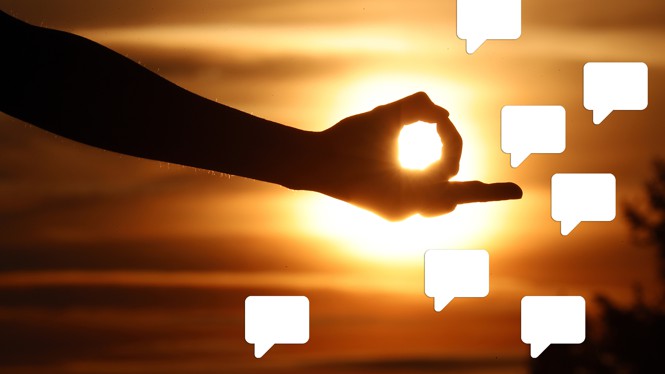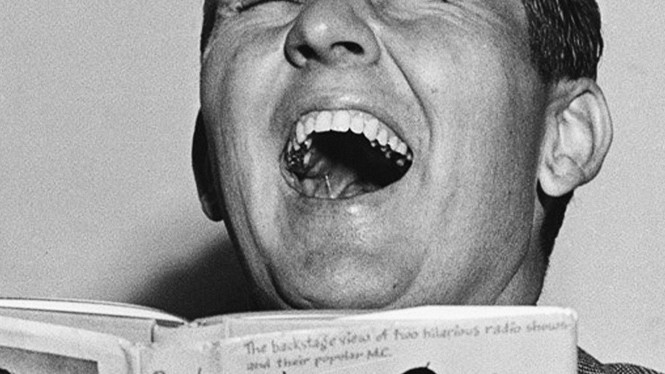How Obligations Can Fuel Happiness
This is an edition of The Atlantic Daily, a newsletter that guides you through the biggest stories of the day, helps you discover new ideas, and recommends the best in culture. Sign up for it here.
Today, the hosts of our podcast How to Talk to People offer advice on making small talk, finding connection, and prioritizing friendships in a world that doesn’t always put non-romantic relationships first.
First, here are four new stories from The Atlantic:
- Has COVID’s patient zero finally been named?
- The elegant, utterly original comedy of Alex Edelman
- The nerds are bullies now.
- India is not Modi, we once said. I wish I still believed it.
Advice, Not Homework
The title of the most recent season of The Atlantic’s How To podcast, How to Talk to People, was sort of a joke—but not entirely, the podcast’s host, Julie Beck, and its producer, Rebecca Rashid, told me recently. Talking to people is not as easy as it might sound. For instance: How does a person make small talk without fainting from awkwardness? And how can we expand our social connections in a society that’s not exactly built for meeting new people? I chatted with Julie and Becca about this season of the podcast, which wraps up next week, and about the value of focusing on the human relationships that tend to get ignored.
Isabel Fattal: Have either of you taken any advice from the podcast back to your own life? Have you met an acquaintance on a train and said, “It’s been so great talking to you. I’m going to go read my book now”?
Julie Beck: I have not been brave enough to use that line yet, but I also don’t know if the situation has arisen. I definitely feel out of my body when I’m doing small talk sometimes now. I have the meta commentary of, Am I doing a good job?
Becca Rashid: I’ve learned from the show more about boundaries for people who don’t always want to be spoken to. I’m the person striking up a conversation with everyone—at cafés I work at, the bus driver, anyone I see consistently enough.
Julie: You took us to your favorite boba shop, and as we walked in, they were like, “Becca!”
When I think about what I’ve learned, it’s less about me changing my habits than just thinking about community a little bit differently. I'm always beating myself up for not reaching out enough or not doing X, Y, or Z. I tend to think, If I was just more diligent and better and did all of these things, then we would have a beautiful, interconnected, happy community utopia. I’ve learned about balancing the reality of life and people’s different needs and competing priorities. Not everyone is going to have the same priorities as you, and that’s fine. I’ve learned to notice what you have and be grateful for that, and not always try to optimize every facet of how you approach your relationships.
Isabel: I love that, because I think, in our self-help-focused era, you can listen to a podcast like this and think, Oh, this podcast is going to help me optimize every moment of my life. It’s good to remind ourselves that’s not the point.
Julie: Right. We want to give you advice, but we don’t want to give you homework.
Isabel: Julie, after conducting 100 interviews with groups of friends for your “Friendship Files” series, you landed on the six forces that fuel friendship. Has this podcast changed your view of those six forces at all?
Julie: I do think all six forces came across in a lot of these conversations—particularly intention, being deliberate and putting effort in, and also grace, which I think is what we were just talking about in terms of “stop optimizing.” One question I had for myself is whether obligation should be added. I think that word has a really negative connotation: It’s something that you don’t want to do, something you are burdened by. But that was a big thread of conversation throughout this podcast, about how so much of friendship culture in America is designed around not putting obligations on one another.
I don’t think we ever used this, because I felt—and continue to feel, even in this moment—like a cheeseball, pretentious person. But there is a C. S. Lewis quote I really love—he wrote a letter to his friend after his wife died, and reflected on having a lot of free time he wished he didn’t have. He wrote, “One doesn’t realise in early life that the price of freedom is loneliness. To be happy one must be tied.”
I don’t actually think of all obligations as a bad thing. In some ways, the commitments that we make to our friends and our neighbors fuel our happiness.
Isabel: Is there anything else you were hoping to discuss that we didn’t get to?
Julie: Just that Becca and I really became friends while we made the podcast.
Becca: I’m a big “food is my love language” person. Julie has brought me food at work, but she’s also brought food to my house. I think that was the moment I realized we were true friends, Julie. For me, it was the reception of the food.
Related:
Listen to the full How to Talk to People series here.
Today’s News
- The Supreme Court ruled in favor of the Biden administration’s immigration-enforcement guidelines, which prioritize the arrest of undocumented people who have serious criminal records, are deemed threats to national security, or recently crossed the border.
- Starbucks workers in Seattle launched a strike, alleging that Pride-month decorations are being banned in some stores, which Starbucks has denied. Employees of more than 150 locations plan to participate over the next week.
- Temporary I-95 lanes opened today in northeast Philadelphia after a tanker-truck fire closed a stretch of the interstate earlier this month.
Dispatches
- The Books Briefing: You should try listening to your literature, Emma Sarappo writes. Audiobooks are less demanding than their printed counterparts—and maybe that’s a good thing.
Explore all of our newsletters here.
Evening Read

Your Phone Is a Mindfulness Trap
By Michael Owen
“Let’s travel now to moonlit valleys blanketed with heather,” Harry Styles says to me. The pop star’s voice—just shy of songful, velvet-dry—makes it seem as if we’re at a sleepaway camp for lonely grown-ups, where he is my fetching counselor, and now it’s time for lights out.
Styles’s iambic beckoning lies within a “sleep story” in the mindfulness app Calm. Like many of its competitors, Calm has become a catchall destination for emotional well-being. In recent years, I’ve cycled through several of these platforms. Using them turns the amorphous, slightly unaccountable act of meditation into something I can accomplish, and cross off the list. That’s the forte of the modern mobile app, after all: easing the completion of a discrete task. Send an email, watch a show, order Kleenex, run at a moderate pace for 30 minutes, doomscroll yourself to sleep. There’s an app for it, and you’ll know when you’re done.
More From The Atlantic
- Photos of the week: Mormon crickets, dragon boats, floating concert
- “Generative AI should not replace thinking at my university.”
Culture Break

Read. These nine works of serious literature will also make you laugh.
Watch. The Truman Show (available on Hulu, Prime Video, and other streaming platforms) offers powerful insight into the complicities of modern life.
Play. Try out Caleb’s Inferno, our new print-edition puzzle. It starts easy but gets devilishly hard as you descend into its depths.
P.S.
If you’ve only got time for one episode of the How to Talk to People podcast, I’d recommend this one about the two married couples who bought a home together (but, as they find themselves frequently clarifying, are not swingers).
— Isabel
Katherine Hu contributed to this newsletter.
